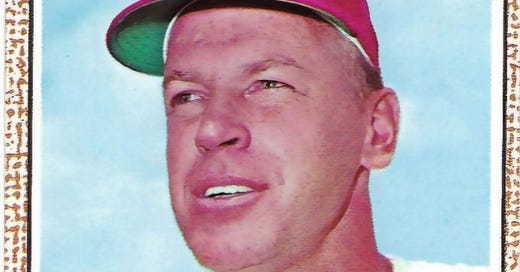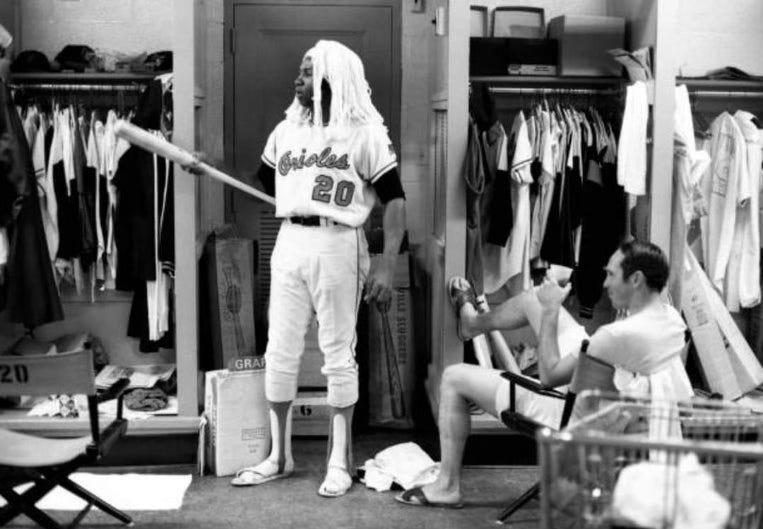The Bird Tapes Interview: Dick Hall (Part 2)
In an interview taped a quarter-century ago, the Orioles' relief specialist unintentionally gives the answers to some of the best Oriole-themed trivia questions you'll ever hear. Test your knowledge!
I had a revelation while listening to my vintage interview with Dick Hall in advance of posting it here at the Bird Tapes.
My conversation with him, I realized, was churning out quite a trail of outstanding Oriole-themed trivia questions.
Hall, the relief pitcher Jim Palmer once described as “always the smartest man in the room,” was a keen and observant storyteller, and that resulted in his Bird Tapes interview producing a batch of stumpers, however unintentionally. (The second half of the interview is available below to paid subscribers. (The first half was posted last week.)
Here are some of them:
Q: When Steve Dalkowski, the hard-throwing minor league legend, injured in his arm on the last day of spring training in 1963 after having pitched well enough to finally make the Orioles’ roster, who took his place on the pitching staff? A: A 20-year-old named Dave McNally took his spot. (McNally went on win 181 games for the Orioles over the next 13 seasons while Dalkowski never came close to pitching in the majors again.)
Q: Which pitcher on the Orioles’ pennant-winning teams from 1969-71 once set a record for hitting home runs? A: Hall did it as an everyday player for a winter-ball team in Mazatlan, Mexico, in 1954, before he became a pitcher. (He was such a good athlete that the Pirates, who’d signed him, saw him as an everyday player early in his career.)
Q: Which Oriole pitcher from that era once phoned the opposing bullpen mid-game and, imitating the opposing manager, ordered a pitcher to warm up? A: Moe Drabowsky, the one and only, did it during a game in Kansas City in 1970, and then, feeling guilty after the Royals’ Lew Krausse did start to warm up, he called the Royals’ bullpen back and confessed to his prank.
Q: Who came up with the idea of keeping the infield grass at Memorial Stadium cut extremely short in the mid-1960s, creating a rock-hard surface? A: Pitching coach Harry “The Cat” Brecheen realized that his staff – and the Orioles as a whole – would benefit because Gold Glovers Brooks Robinson and Luis Aparicio could handle ground balls on a close-to-concrete surface but opposing infielders couldn’t.
And lastly:
Q: When the Orioles held sessions of their legendary Kangaroo Court with mop-topped Frank Robinson presiding in the 1960s and collectively fined players for such lapses as asking stupid questions, forgetting how many were out in an inning or falling asleep in the bullpen, who handled the money?
A: “I was the treasurer,” Hall said. (This is revealed in the part of the interview posted below.)
Full disclosure, I love this detail from deep in the crevices of Orioles history. The Kangaroo Court is a classic piece of baseball lore and Hall’s revelation fleshes it out as a memory. You can almost hear Frank Robinson issuing a final judgment to a player who, say, had started heading toward the dugout after the second out of an inning.
Give Dick a dollar!
“It was great for morale,” Hall said of the Kangaroo Court.
That he handled the money made perfect sense. Hall graduated from Swarthmore College with an economics degree, and when his baseball career was floundering in the late 1950s, he started taking accounting courses because he’d gotten married and thought he’d better find another way to support his family. A move to the bullpen saved his career and extended it into the 1970s, and once he was done, he had a long career as an accountant in Baltimore.
I mean, could you possibly find a better player to handle your Kangaroo Court cash stash?
Hall wasn’t the biggest star among the nearly 100 Oriole figures whom I interviewed for my book on the history of the team, which was published in 2001, but he was among my favorites, telling story after story with wry humor and great insight. In the first half, posted last week, he detailed the many curves this career took before he found great success as a late-inning specialist in Baltimore. In the finale to the interview, posted below, he focuses on others more than himself. He compares the talents of the four Baltimore managers he played for, including Paul Richards and Earl Weaver. He recreates, in great detail, the outrageous nuttiness of Drabowsky’s many pranks.
It’s the only Bird Tapes interview in which you’ll hear a player confess to eating a 17-year locust and also compare pitching in the majors to preparing a tax return.
My advice? Don’t miss it.
Keep reading with a 7-day free trial
Subscribe to The Bird Tapes to keep reading this post and get 7 days of free access to the full post archives.






